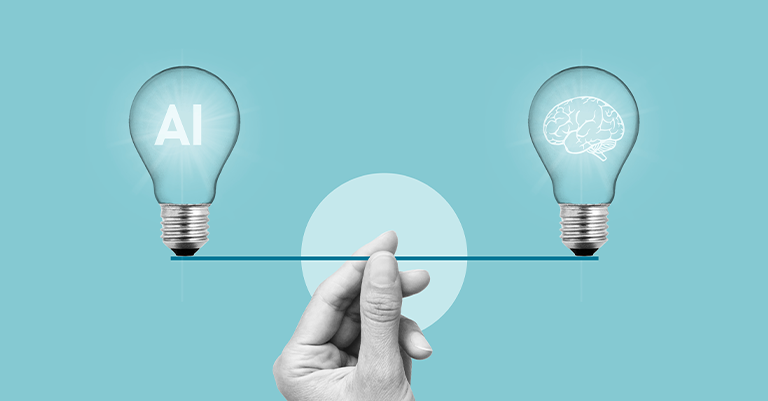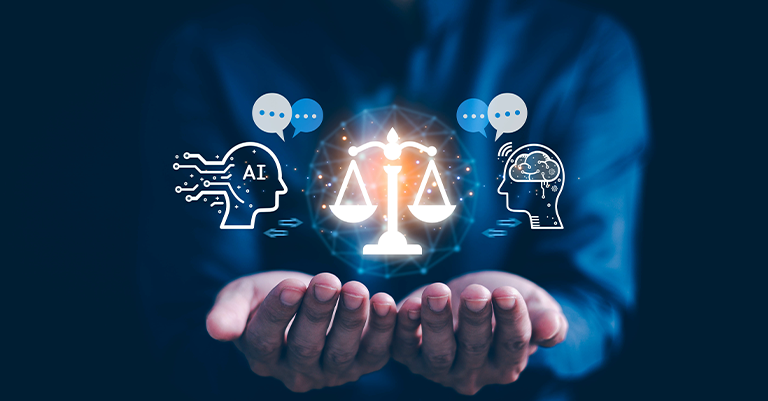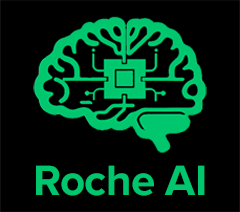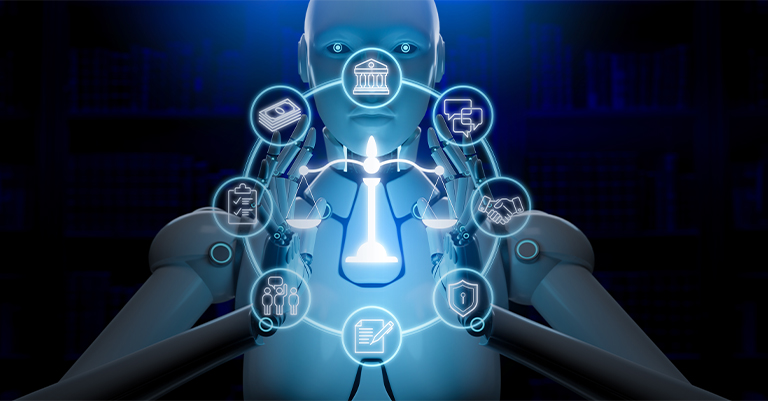AI Ethics: Exploring the Impact on Society and Industries
Artificial intelligence (AI) is gaining ground in almost every aspect of society. It is present in most industries, from healthcare to finance to entertainment. Integrating AI into our daily lives has numerous benefits. However, we must tread carefully, especially when it involves AI ethics.
Understanding AI’s ethics requires reviewing the moral impact of the associated technologies. This entails considering how AI affects privacy, fairness, and accountability. These ethical considerations become more crucial as AI engrains itself into our daily lives. This article explores the key ethical issues related to AI and what they mean for society moving forward.
What are Ethics?

Ethics serve as a guiding framework that helps us navigate the complex landscape of right and wrong. By examining our moral values and principles, we gain a clearer understanding of the standards we hold ourselves to. These ethical standards are not just abstract ideas—they influence every decision we make and how we interact with others. Whether in personal relationships, business, or society at large, ethics require us to consider the consequences of our actions.
Ethics compel us to choose fairness, honesty, and integrity, even when it’s challenging. They promote a just and responsible way of living, where individual and collective well-being are prioritized over selfish gain. Ethics also remind us that every decision carries weight and that maintaining a high ethical standard contributes to a more respectful, trustworthy, and harmonious society.
General Concept of Ethics
The basic idea of ethics is the understanding and application of moral principles, which extend from several sources, such as culture, religion, philosophy, or societal norms.
Ethics come in three accepted varieties:
- Normative Ethics is the branch of philosophy that studies how people should act morally and is concerned with what is right and wrong.
- Meta-ethics explores the nature of ethical statements, what they mean, and how people understand moral concepts.
- Applied Ethics (also known as practical ethics) is the study of applying moral principles and ethical theories to real-world situations.
Application of Ethics
You can apply ethics to practically any field to ensure that your actions are just and fair. Here are a few examples:
- Business Ethics: The guidelines companies use to advance their missions, such as the treatment of employees, customers, and the environment.
- Medical Ethics: How best to proceed regarding patient care, consent, and the distribution of resources.
- Environmental Ethics: The moral relationship between humans and the environment, the promotion of sustainability, and the responsible use of resources.
- Social Ethics: The decisions made regarding human rights, social justice, and community responsibilities.
Ultimately, ethics help us make legally and morally acceptable choices. They encourage accountability, respect for our peers, and overall responsibility in our personal and professional lives.
What are AI Ethics?

AI ethics, much like traditional ethics, provides a crucial framework for navigating the complex landscape of artificial intelligence. It consists of principles and guidelines that govern the responsible design, development, and deployment of AI systems. This ethical framework ensures that AI technologies are created and used in ways that promote fairness, transparency, and accountability. Without these guiding principles, AI could be deployed with little regard for the potential harm it may cause to individuals or society as a whole.
AI ethics plays a vital role in preventing misuse, bias, and discrimination in AI applications. It ensures that these systems serve the common good. Fairness and accountability are central to AI ethics. They aim to make sure that AI systems do not reinforce existing inequalities. AI ethics also works to prevent the introduction of new forms of bias. Transparency is another key element. It requires that AI decision-making processes are understandable and explainable to users and stakeholders.
Beyond just fairness and accountability, AI ethics delves deeply into the moral implications of the decisions made by AI systems. As AI becomes more autonomous and influential in various sectors—healthcare, finance, law enforcement, and beyond—it is critical to assess the potential consequences of its actions.
AI systems, while powerful, lack human judgment and empathy. Therefore, ethical guidelines are essential in determining how AI systems should act in sensitive situations. By focusing on ethical design, we can ensure that AI decisions align with human values, minimizing risks while maximizing the benefits AI can bring to society.
Fairness and Transparency
Fairness and transparency are two key elements of AI ethics. Together, they ensure that AI systems operate justly and are understandable. Fairness means that AI decisions are free from bias. However, if the data used to train an AI system is biased, the resulting decisions will also be biased, leading to unfair outcomes. This poses serious ethical concerns, particularly in areas like hiring or lending, where biased AI systems can reinforce discrimination and inequality. To address this, developers must work to identify and eliminate bias from AI systems to ensure that decisions are equitable for all users.
Transparency is equally important, as it allows people to understand how AI systems make decisions. Many AI systems, such as those used by banks to approve or deny loans, can seem like “black boxes” where decisions are made without explanation. Ethical AI requires that these processes be transparent. Users should know what factors were considered in the decision-making process and how the AI arrived at its conclusion.
For example, a bank using AI to approve loans should clearly explain the criteria used by the AI system. This helps users understand why a loan was approved or denied, ensuring that the system is not only fair but also accountable. By promoting both fairness and transparency, AI developers can build trust and ensure that AI technologies are used responsibly, serving society in an ethical and just manner.
Accountability
Accountability is a critical aspect of AI ethics. When an AI system causes harm or makes a wrong decision, it is essential to know who is responsible. While we are not talking about extreme scenarios like those in science fiction, AI still has a significant impact on people’s lives. For example, AI systems are used to approve loans or make medical diagnoses. If an AI makes an incorrect decision, such as wrongly denying a loan or giving a wrong medical result, determining who is accountable is crucial.
The challenge lies in deciding who should bear the responsibility. Should it be the company that uses the AI, the developers who created the system, or does the blame fall on the AI itself? This question remains unresolved, and accountability in AI is still a grey area. Establishing clear guidelines for accountability is important to ensure AI systems are used ethically.
Understanding AI ethics, including accountability, is the first step toward creating technologies that serve society responsibly. It ensures that AI systems are not only innovative but also operate in ways that benefit everyone fairly and justly.
Why are AI Ethics Important?

AI ethics concerning societal and individual impact are paramount as artificial intelligence continues to seep into our daily lives. AI is transforming industries, reshaping the job landscape, and altering social structures. This widespread integration raises ethical concerns regarding fairness, privacy, and the preservation of human autonomy. Without proper ethical guidelines, AI systems could further enhance societal biases, infringe on personal privacy, or influence individual decision-making in areas ranging from consumer choices to voting behavior.
Moreover, AI ethics plays a crucial role in maintaining public trust in institutions and ensuring equal access to opportunities. As AI-driven systems become more prevalent in hiring, lending, and public services, their ethical implementation is essential to prevent discrimination and promote fair treatment across society. The potential for AI to widen the digital divide also underscores the moral imperative of ensuring equal access to AI-enhanced services and opportunities.
Looking ahead, ethical AI development is vital for aligning technological progress with broader societal values and long-term goals. This includes leveraging AI to address global challenges like climate change while preserving cultural diversity and heritage. As AI systems advance, particularly in emotional AI and caregiving roles, ethical considerations in human-AI interactions become increasingly complex and vital. Ultimately, AI’s ethical development and application are crucial for harnessing its potential to benefit society. However, ensuring that AI respects individual rights and values is equally important. Attaining this balance requires ongoing collaboration between developers, ethicists, policymakers, and the public.
Key Ethical Concerns in AI Development
The rapid advancement of AI has led to remarkable technological progress, but it also brings significant ethical challenges. Three key concerns are central to the ethical development of AI: bias and fairness, privacy and surveillance, and accountability and transparency. Addressing these issues is essential to ensure that AI systems are not only innovative but also ethical, equitable, and responsible in their applications. As AI becomes more ingrained in daily life, developing solutions that protect human rights and uphold ethical standards will become even more critical for both developers and policymakers.
Bias and Fairness
Bias and fairness are crucial concerns in AI development. As AI systems are used in decision-making areas like hiring, lending, and criminal justice, they risk perpetuating or amplifying biases present in the data used to train them. For example, AI models trained on biased historical data may reinforce discriminatory practices, leading to unfair outcomes for certain groups. This is particularly problematic in sensitive areas such as job applications or credit scoring, where biased AI could unfairly disadvantage minority groups.
To address this, developers must use diverse and representative datasets that better reflect the full spectrum of society. Regular bias audits are essential to identify and correct any inequalities that may emerge in an AI system’s decision-making process. Inclusive development teams can further mitigate bias by bringing a variety of perspectives and experiences into the development process.
Additionally, fairness-aware machine learning techniques are becoming increasingly popular. These methods aim to ensure that AI systems produce equitable outcomes, regardless of the biases present in the training data. By applying these strategies, developers can help reduce the risks of bias and ensure that AI systems promote fairness and equality.
Privacy and Surveillance

AI’s growing adoption has heightened concerns about privacy and surveillance. AI systems often require vast amounts of personal data to function, raising ethical questions about consent, data ownership, and appropriate use. The ability of AI to analyze data on a large scale can result in revealing unexpected insights about individuals, often without their knowledge or consent. For example, AI in social media can predict behaviors or preferences, potentially infringing on users’ privacy.
Surveillance technologies powered by AI, such as facial recognition, have also sparked significant privacy concerns. These systems can be used for mass surveillance, leading to the potential for misuse by governments or corporations. The lack of clear regulation around AI surveillance further complicates matters, as individuals may be unaware of when or how their data is being used.
To address these concerns, strong regulations and privacy-preserving techniques are necessary. Differential privacy, for instance, can help protect individual data while still allowing AI systems to function effectively. Clear consent protocols and transparent data use policies are also vital in maintaining public trust in AI technologies. Balancing AI’s capabilities with privacy protection will require ongoing efforts from both developers and regulators.
Accountability and Transparency
Accountability and transparency are critical issues as AI systems become more complex and autonomous. Many AI models, especially those based on deep learning, function as “black boxes,” making their decision-making processes difficult to interpret. This lack of transparency is particularly problematic in high-stakes areas, such as healthcare or criminal justice, where understanding how an AI reached its decision is vital.
Without transparency, it’s hard to know who is responsible when AI systems make mistakes or cause harm. Is it the developers, the organizations using the AI, or the AI itself? This ambiguity raises significant ethical questions about liability and accountability. In cases where AI decisions negatively impact individuals, clear lines of responsibility are essential for addressing grievances and ensuring justice.
To improve accountability, AI systems must be designed with explainability in mind. Explainable AI (XAI) allows users to understand how an AI model arrived at its decision, providing greater clarity and transparency. In addition, developing clear accountability frameworks is crucial. These frameworks should outline who is responsible for AI systems at each stage—from development to deployment—and establish guidelines for addressing errors or harms caused by AI. Regular testing and auditing of AI systems are also necessary to ensure they perform ethically and responsibly.
Recap
Navigating these ethical concerns is crucial for ensuring that AI systems are not only powerful but also trustworthy, fair, and beneficial to society. As AI continues to shape various aspects of our lives—from healthcare and finance to law enforcement and education—addressing the ethical challenges that arise becomes more important than ever. Ensuring that AI operates in ways that respect human rights, promote equality, and protect individual privacy is key to building public trust in these technologies.
Ongoing collaboration between technologists, ethicists, policymakers, and the public is vital to tackling these complex challenges effectively. Technologists need to develop AI systems that are transparent, explainable, and accountable, while ethicists provide insights on how these technologies can align with societal values. Policymakers must create regulations that balance innovation with ethical safeguards, ensuring that AI systems operate responsibly without stifling progress. Meanwhile, public involvement is essential for understanding the societal impacts of AI and ensuring that its development reflects diverse perspectives and needs.
Together, these stakeholders can create a comprehensive ethical framework that guides the responsible development and deployment of AI. This approach not only helps prevent misuse but also fosters innovation that enhances the well-being of individuals and communities. By prioritizing ethics in AI development, we can ensure that these technologies are designed and used in ways that truly benefit society while minimizing risks and harm.
The Impact of AI Ethics on Various Industries

AI ethics plays a crucial role across various industries, including healthcare, finance, and law enforcement. As AI technology continues to evolve, it presents significant opportunities but also brings unique ethical challenges. Each industry must navigate concerns about fairness, accountability, and transparency while ensuring AI benefits society.
In healthcare, the ethical focus revolves around patient privacy, accurate diagnoses, and equitable access to AI-powered medical services. The finance sector deals with issues of fairness in lending, transparency in AI decision-making, and potential economic inequality. Law enforcement must address biases in predictive policing and facial recognition, ensuring civil rights are protected.
While each industry has specific challenges, they share common ethical principles that guide the responsible use of AI. Robust frameworks are necessary to ensure fairness, transparency, and accountability in AI applications, helping minimize harm and promote public trust.
Healthcare
AI is transforming healthcare by improving diagnosis, treatment planning, and drug discovery. However, the use of AI raises several ethical concerns, starting with patient privacy. AI systems require vast amounts of personal health data to function effectively. Protecting this sensitive information is vital, as any data breach could lead to severe privacy violations.
Another major concern is the accuracy of AI-driven diagnoses. While AI has improved the speed and precision of medical decisions, it is not perfect. Errors in diagnosis or treatment recommendations can have serious consequences. Therefore, the balance between relying on AI and retaining human medical expertise is crucial. Physicians must always remain involved to provide judgment and empathy that AI lacks.
Equitable access to AI-enhanced healthcare is another pressing issue. Advanced AI tools should not be limited to certain populations based on wealth or location. Ensuring widespread access helps prevent the risk of AI widening health disparities. Balancing AI capabilities with human care and maintaining fairness in access are ongoing ethical challenges in healthcare.
Finance
AI is transforming healthcare by improving diagnosis, treatment planning, and drug discovery. However, the use of AI raises several ethical concerns, starting with patient privacy. AI systems require vast amounts of personal health data to function effectively. Protecting this sensitive information is vital, as any data breach could lead to severe privacy violations.
Another major concern is the accuracy of AI-driven diagnoses. While AI has improved the speed and precision of medical decisions, it is not perfect. Errors in diagnosis or treatment recommendations can have serious consequences. Therefore, the balance between relying on AI and retaining human medical expertise is crucial. Physicians must always remain involved to provide judgment and empathy that AI lacks.
Equitable access to AI-enhanced healthcare is another pressing issue. Advanced AI tools should not be limited to certain populations based on wealth or location. Ensuring widespread access helps prevent the risk of AI widening health disparities. Balancing AI capabilities with human care and maintaining fairness in access are ongoing ethical challenges in healthcare.
Law Enforcement

AI is increasingly used in law enforcement for predictive policing and facial recognition, but these tools come with significant ethical challenges. Predictive policing uses historical data to predict where crimes might occur, but it can unintentionally reinforce biases if the data is flawed. This can lead to over-policing in marginalized communities, perpetuating existing inequalities.
Facial recognition technology also raises ethical concerns, particularly around privacy and civil liberties. The widespread use of facial recognition can enable mass surveillance, infringing on individuals’ rights to privacy. Additionally, studies have shown that facial recognition is often less accurate in identifying people of color, leading to potential misidentification and wrongful consequences.
To mitigate these issues, it’s essential to ensure that AI systems in law enforcement are transparent and fair. Clear guidelines regarding how these technologies are used must also be created, and accountability measures must be in place to protect civil rights. Balancing public safety with the protection of individual freedoms is a key ethical challenge for AI in law enforcement.
Education
AI is increasingly used in education for personalized learning, grading, and administrative tasks, but it raises several ethical concerns. One major issue is bias in AI-driven learning platforms. These systems, often trained on data reflecting existing inequalities, may reinforce educational disparities, particularly for marginalized students. For instance, AI systems may provide lower-quality recommendations or learning opportunities to students from underrepresented backgrounds. Ensuring fairness in AI-driven education tools is critical to prevent further widening of the education gap.
Privacy is another concern. AI tools that collect student data for personalized learning could inadvertently compromise student privacy. This is especially problematic if data is misused or shared with third parties without consent. Schools must implement strict data protection measures to safeguard student information.
Lastly, the human element in education must be preserved. While AI can assist with administrative tasks or content delivery, the role of teachers in providing emotional support, critical thinking guidance, and personal mentorship remains irreplaceable. AI ethics in education must ensure that technology enhances, rather than replaces, human-led learning.
Transportation
In transportation, AI powers autonomous vehicles, traffic management, and ride-sharing platforms. Ethical concerns arise around safety, accountability, and environmental impact. Autonomous vehicles, while promising safer roads, also pose significant safety risks if their algorithms fail to make correct decisions in real-world conditions. A crucial question remains: who is responsible when an AI-powered vehicle causes an accident—the manufacturer, software developer, or the vehicle owner? Clear accountability frameworks must be established to address these potential liabilities.
Privacy is also at stake. Autonomous vehicles and ride-sharing platforms collect vast amounts of data, including location tracking and passenger behavior. Ethical concerns around how this data is stored, used, or shared are significant, requiring strong regulations to protect individual privacy.
Additionally, the environmental impact of AI in transportation is a growing concern. While autonomous vehicles could reduce emissions by optimizing routes, they could also increase overall travel demand, leading to more vehicles on the road. Ethical AI use in transportation must prioritize sustainability alongside technological innovation.
Retail

AI in retail is transforming the customer experience through personalized shopping, inventory management, and customer service. However, it raises important ethical concerns regarding privacy and bias. AI systems that track consumer behavior for personalized recommendations often collect personal data, raising concerns about data security and consent. Retailers must ensure that consumer data is protected and that users have control over how their information is used.
Bias is another ethical issue. AI-driven pricing models or product recommendations could unintentionally favor certain demographics, excluding others based on buying habits or socioeconomic status. For example, AI systems might show different prices to different customers, leading to unfair outcomes. To mitigate this, retail companies need to audit their AI systems for fairness and transparency regularly.
Lastly, AI could impact employment in retail, as automated systems and AI-powered robots replace human workers in customer service or stock management. Ensuring that AI adoption in retail does not lead to widespread job displacement, but rather enhances human roles, is a critical ethical consideration.
Across these industries, AI ethics is essential for creating systems that are not only innovative but also fair, transparent, and beneficial for society as a whole. Developing robust ethical guidelines in education, transportation, and retail will help ensure AI’s positive impact while minimizing harm.
The Role of Regulations and Policies in AI Ethics

The role of regulations and policies in AI ethics is becoming increasingly important as AI technologies rapidly evolve. Currently, there is no universal standard for AI governance, and approaches vary widely across the globe. In the European Union, regulations like the General Data Protection Regulation (GDPR) and the proposed AI Act set stringent standards for AI ethics. The GDPR focuses on data privacy and the responsible handling of personal information, while the AI Act aims to address issues such as algorithmic transparency, fairness, and accountability, with an emphasis on protecting human rights and preventing harmful AI applications.
In contrast, the United States has a more fragmented approach to AI regulation. There are no overarching federal laws governing AI ethics. Instead, the U.S. relies on sector-specific regulations like those in healthcare, finance, and transportation. These laws address AI in particular industries but lack the comprehensive coverage needed to regulate AI across all sectors.
Many other countries have developed non-binding AI ethics guidelines. While these frameworks provide useful principles, they often lack enforcement mechanisms, limiting their effectiveness. As AI continues to grow, there is increasing pressure for governments worldwide to implement enforceable AI laws that address ethical concerns.
Looking to the future, global regulations are likely to focus on ensuring algorithmic transparency—so people understand how AI decisions are made—and promoting fairness and accountability in AI systems. One of the key challenges will be balancing the need for ethical safeguards with the desire to encourage innovation. International cooperation on AI governance is also critical, as AI systems often operate across borders, requiring coordinated efforts to create effective regulations that protect individuals while fostering technological advancement.
The Future of AI Ethics

The future of AI ethics will face increasingly complex challenges as technology continues to advance. One of the biggest potential issues is the development of artificial general intelligence (AGI)—AI systems that can perform any intellectual task that a human can. If AGI becomes a reality, it will raise significant ethical questions about the rights and responsibilities of AI entities, as well as how to ensure their actions align with human values. Additionally, the long-term societal impacts of widespread AI adoption, such as changes in employment and economic structures, will require careful consideration to ensure these technologies benefit everyone.
Ongoing concerns like bias in AI systems and privacy issues are expected to become more pressing as AI becomes more integrated into daily life. For instance, biased algorithms could reinforce existing social inequalities, while the increased collection of data for AI purposes may heighten privacy risks. The future of work is also a key concern, as automation driven by AI could displace many jobs, requiring proactive solutions to minimize economic disruption and ensure fair opportunities for all.
Despite these challenges, the prospects for ethical AI remain promising. There is growing awareness of AI ethics among developers, policymakers, and the public, which is helping to drive positive change. Advances in explainable AI and fairness-aware machine learning are offering technical solutions to some of these ethical issues. The development of globally-recognized ethical frameworks and standards could help guide AI innovation in a responsible manner. Achieving ethical AI will ultimately depend on collaboration among diverse stakeholders, proactive policy efforts, and a shared commitment to aligning AI development with human values for the benefit of society.
Closing Thoughts on the AI Ethics

AI ethics plays a fundamental role in shaping how society integrates artificial intelligence. As we’ve explored, ethical concerns like bias, fairness, privacy, accountability, and transparency require immediate attention to ensure AI systems serve everyone equitably. These concerns do not only affect industries like healthcare, finance, and law enforcement but also extend to sectors such as education, transportation, and retail. Each industry faces unique challenges, yet all must balance innovation with the ethical implications of AI technologies.
Collaboration is crucial in addressing these ethical issues. Technologists, ethicists, policymakers, and the public must work together to create clear guidelines that protect individual rights, promote fairness, and ensure transparency. Strong regulations, ethical AI design, and active public involvement help create accountable systems that benefit society. This ongoing dialogue keeps AI development aligned with human values and societal needs.
Looking ahead, the future of AI ethics presents both promise and complexity. As AI evolves, especially with advancements like artificial general intelligence, the ethical stakes will increase. By proactively addressing these challenges with thoughtful regulation, fair AI systems, and international cooperation, we can ensure AI drives positive change and minimizes potential harm to society.





